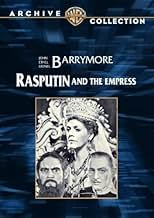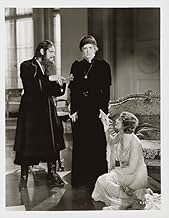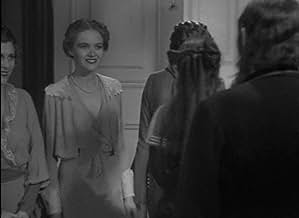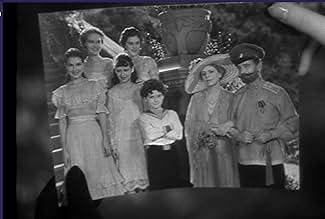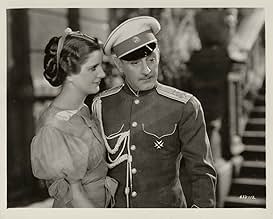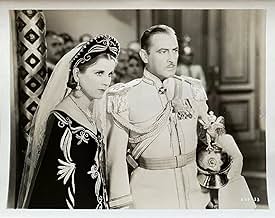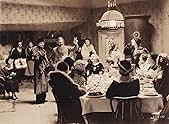VALUTAZIONE IMDb
6,5/10
1297
LA TUA VALUTAZIONE
Aggiungi una trama nella tua linguaA prince plots to kill the mad monk Rasputin for the good of the czar, the czarina and Russia.A prince plots to kill the mad monk Rasputin for the good of the czar, the czarina and Russia.A prince plots to kill the mad monk Rasputin for the good of the czar, the czarina and Russia.
- Regia
- Sceneggiatura
- Star
- Candidato a 1 Oscar
- 4 vittorie e 1 candidatura in totale
Luis Alberni
- Photographer's Assistant
- (non citato nei titoli originali)
Mary Alden
- Natasha's Lady in Waiting
- (non citato nei titoli originali)
Robert Anderson
- Undetermined Secondary Role
- (non citato nei titoli originali)
Oscar Apfel
- Undetermined Secondary Role
- (non citato nei titoli originali)
Henry Armetta
- Photographer
- (non citato nei titoli originali)
Hooper Atchley
- Rasputin's Henchman
- (non citato nei titoli originali)
Mischa Auer
- Butler Pouring Drinks at Party
- (non citato nei titoli originali)
Reginald Barlow
- General Who Underestimated the Japanese
- (non citato nei titoli originali)
Barbara Barondess
- Woman Getting Cigarette
- (non citato nei titoli originali)
Max Barwyn
- Bald Man Trying to See Duna
- (non citato nei titoli originali)
Recensioni in evidenza
This is a reasonably decent movie, well acted (particularly by Lionel, who practically chews the scenery as Rasputin) and the sets and costumes are fairly nice. But the main selling point is that this is the only time the three Barrymores -Ethel, John and Lionel did a movie together. It's a good movie but could have been much better.
A true example of the assembly line style film-making of the old studios, where one doubts if the screenwriter ever visit the set, or did the director ever sit at an editing bench. Lionel Barrymore, however is a treat as the grimy, kooky Rasputin. He doesn't go for one-note scary. He's seen as a fun party animal, a believable healer, and the world's worst dinner guest. Other than that, John is wasted as the hero, as is their sister Ethel.
...forget about it. This film is completely inaccurate in its portrayal of actual events in Russian history. As for the nature and character of the historical figures involved, the three Barrymores give good renditions. There is Ethel Barrymore looking every inch the empress and giving a convincing portrayal of a woman concerned for the welfare of her very ill son - and I would expect that. What I didn't expect is how weird it would be to watch a film in which John Barrymore is the shining hero and Lionel Barrymore is a truly diabolical villain, and each are spectacularly convincing in their portrayals. Lionel is really the center of attention here as he plays the evil Rasputin whose ability to sidestep assassination attempts is legendary, and here a few logical explanations are given to some of his alleged abilities. However, none can explain what happened at the end of his life - how he was poisoned, bludgeoned, shot, and finally thrown into an icy river and still managed to cling to life for awhile.
Although Tsar Nicholas is accurately portrayed as a rather weak willed man and the Romanov marriage is also accurately portrayed as one of the few royal arranged marriages that also turned out to be a love match, there is a mischaracterization of the Tsar as being progressive and wanting a Duma only to have Rasputin defeat that plan. In fact, Nicholas was autocratic in his outlook and distrusted any attempt to give the people more say in their government. This sets up one of the great ironic struggles in the film - that of aristocrat Prince Paul Chegodieff (John Barrymore) wanting more for the peasants in the way of both bread and democracy, and that of peasant mystic Rasputin (Lionel Barrymore) saying that it was God's will that the peasants were poor and powerless. Paul wants to save Russia, Rasputin wants to rule it.
Another piece of fiction shown in the movie for dramatic measure are the public proclamations about the illness of Tsaravich Alexai, the heir to the Russian throne. In fact one of the things that turned the Russian people against the royal family - besides the fact that they were starving during WWI - was that the people assumed that Rasputin's hold over the empress was because they were lovers. The Romanovs did not want it to be known that the only son in the family and heir to the throne had a serious disease - in this case hemophilia - that kept him in very delicate health and would likely lead to a greatly shortened lifespan. They felt it would leave them vulnerable to the overthrowing of their rule. Ironically hiding the truth and leaving Rasputin's relationship to the empress unexplained also led to exactly that.
Watch this one for the high production values and compelling performances by the members of Hollywood's royal family during its golden age, but as for a Russian history lesson, look elsewhere.
Although Tsar Nicholas is accurately portrayed as a rather weak willed man and the Romanov marriage is also accurately portrayed as one of the few royal arranged marriages that also turned out to be a love match, there is a mischaracterization of the Tsar as being progressive and wanting a Duma only to have Rasputin defeat that plan. In fact, Nicholas was autocratic in his outlook and distrusted any attempt to give the people more say in their government. This sets up one of the great ironic struggles in the film - that of aristocrat Prince Paul Chegodieff (John Barrymore) wanting more for the peasants in the way of both bread and democracy, and that of peasant mystic Rasputin (Lionel Barrymore) saying that it was God's will that the peasants were poor and powerless. Paul wants to save Russia, Rasputin wants to rule it.
Another piece of fiction shown in the movie for dramatic measure are the public proclamations about the illness of Tsaravich Alexai, the heir to the Russian throne. In fact one of the things that turned the Russian people against the royal family - besides the fact that they were starving during WWI - was that the people assumed that Rasputin's hold over the empress was because they were lovers. The Romanovs did not want it to be known that the only son in the family and heir to the throne had a serious disease - in this case hemophilia - that kept him in very delicate health and would likely lead to a greatly shortened lifespan. They felt it would leave them vulnerable to the overthrowing of their rule. Ironically hiding the truth and leaving Rasputin's relationship to the empress unexplained also led to exactly that.
Watch this one for the high production values and compelling performances by the members of Hollywood's royal family during its golden age, but as for a Russian history lesson, look elsewhere.
Rasputin and the Empress shouldn't be used as a lesson of pre-Soviet Russia. Names have been changed (and that didn't prevent MGM from law suits) and a lot of the information we now know about this period of Russian history - was not known in 1932.
As other people have commented about this being the only film that Ethel, John, and Lionel Barrymore appeared together, this movie doesn't show why the Barrymores have the reputation that they have. John Barrymore's career started going downhill after the introduction of sound. Lionel Barrymore, wearing one of the phoniest fake beards, tries to capture the charisma and sense of control that Rasputin had over Czarina Alexandra and the Czarevitch. Ethel Barrymore gives an understated performance - too understated at times. When her only son seems to be close to possible death, she doesn't seem all that bothered.
C. Henry Gordon is a great Grand Duke Igor, Ralph Morgan is a convincing Czar Nicholas II, but they don't appear that frequently. Don't expect anyone to speak with a Russian accent or even attempting and accent.
Rasputin is one of the most interesting people in the world during the early 20th Century. He was also one of the most enigmatic and contradictory. A holy man who was accused of raping a nun, excessive drinking, and being power hungry. Barrymore's portrayal of Rasputin plays this up, plus making claims that he will be Russia. He seems almost like Charles Manson at times in the way he can make someone, especially the Czarevitch, behave like they are totally different people compared to the way they acted before meeting Rasputin.
It is best to watch this movie as just that - a fictional representation of various accounts of what happened in the royal court of Russia in its final days. The writers included Charles MacArthur, Ben Hecht, Robert Sherwood, Mercedes de Acosta, and Lenore Coffee - some of the best writers of the period.
It's worth a view - don't expect historical accuracy, but it is an interesting film that tries to show a much different world than what Americans would have known.
As other people have commented about this being the only film that Ethel, John, and Lionel Barrymore appeared together, this movie doesn't show why the Barrymores have the reputation that they have. John Barrymore's career started going downhill after the introduction of sound. Lionel Barrymore, wearing one of the phoniest fake beards, tries to capture the charisma and sense of control that Rasputin had over Czarina Alexandra and the Czarevitch. Ethel Barrymore gives an understated performance - too understated at times. When her only son seems to be close to possible death, she doesn't seem all that bothered.
C. Henry Gordon is a great Grand Duke Igor, Ralph Morgan is a convincing Czar Nicholas II, but they don't appear that frequently. Don't expect anyone to speak with a Russian accent or even attempting and accent.
Rasputin is one of the most interesting people in the world during the early 20th Century. He was also one of the most enigmatic and contradictory. A holy man who was accused of raping a nun, excessive drinking, and being power hungry. Barrymore's portrayal of Rasputin plays this up, plus making claims that he will be Russia. He seems almost like Charles Manson at times in the way he can make someone, especially the Czarevitch, behave like they are totally different people compared to the way they acted before meeting Rasputin.
It is best to watch this movie as just that - a fictional representation of various accounts of what happened in the royal court of Russia in its final days. The writers included Charles MacArthur, Ben Hecht, Robert Sherwood, Mercedes de Acosta, and Lenore Coffee - some of the best writers of the period.
It's worth a view - don't expect historical accuracy, but it is an interesting film that tries to show a much different world than what Americans would have known.
Rasputin and the Empress (1932)
*** (out of 4)
Lionel, John and Ethel Barrymore star in this film, which was the only one that all three legends appeared in together. After her son is near death, Czarina Alexandria (Ethel) lets the monk Rasputin (Lionel) pray with her son who eventually heals and the monk gives credit to God. Saving her son, the monk soon finds himself gaining power inside the government but this doesn't sit well with Prince Chegodieff (John) who will stop at nothing to prove the monk is mad. Apparently MGM was sued due to how inaccurate the story is here so if you want a history lesson you should go read a book but if you want to see all three Barrymore's together then this is the only film out there that will suit you. The film should have been a lot better than it is but the thing drags at several points and I'm sure fifteen or so minutes could have been trimmed from the 123-minute running time, although apparently the film ran longer when originally released. The performances aren't what you'd expect but it's certainly fun seeing the three Barrymore's working together. Lionel actually goes way over the top, which is something you'd expect from John but he actually manages to be quite calm and cool throughout the film. John certainly gives the best performance but it's Lionel who steals the film with his fake beard and over the top antics. Ethel is good in her role as is the supporting work from Ralph Morgan. The costumes and set design are wonderful and I really enjoyed the made up ending, which contains some pretty strong violence.
*** (out of 4)
Lionel, John and Ethel Barrymore star in this film, which was the only one that all three legends appeared in together. After her son is near death, Czarina Alexandria (Ethel) lets the monk Rasputin (Lionel) pray with her son who eventually heals and the monk gives credit to God. Saving her son, the monk soon finds himself gaining power inside the government but this doesn't sit well with Prince Chegodieff (John) who will stop at nothing to prove the monk is mad. Apparently MGM was sued due to how inaccurate the story is here so if you want a history lesson you should go read a book but if you want to see all three Barrymore's together then this is the only film out there that will suit you. The film should have been a lot better than it is but the thing drags at several points and I'm sure fifteen or so minutes could have been trimmed from the 123-minute running time, although apparently the film ran longer when originally released. The performances aren't what you'd expect but it's certainly fun seeing the three Barrymore's working together. Lionel actually goes way over the top, which is something you'd expect from John but he actually manages to be quite calm and cool throughout the film. John certainly gives the best performance but it's Lionel who steals the film with his fake beard and over the top antics. Ethel is good in her role as is the supporting work from Ralph Morgan. The costumes and set design are wonderful and I really enjoyed the made up ending, which contains some pretty strong violence.
Lo sapevi?
- QuizAnnoyed that his brother John Barrymore was trying to show him up by placing his hand on him while he was finishing a scene (an ancient actor's technique for drawing attention to oneself), Lionel Barrymore excused himself from the set and went to the back lot to find a telephone. He then phoned the set and told director Richard Boleslawski that "he'd better advise Mr. John Barrymore to not place his hand on me at the close of this scene, lest I lay one on him!" By the time Lionel returned to the set, John has been advised to keep his hands to himself.
- BlooperThe fact that the Tsarevich was sick was not announced publicly as portrayed in the movie. It was kept a secret.
- Citazioni
Natasha: You don't like him because he's so outspoken. You don't like his manners. Isn't that it?
Prince Chegodieff: No, that's not it. It, its his, smile. It's like a man-eating shark with a bible under his fin.
- Versioni alternativeUpon its premiere "Rasputin and the Empress" ran approximately 132 minutes. Due to the famous lawsuits against it, a number of scenes had to be cut for legal reasons. One critical scene that was deleted was one which implied that Rasputin had raped Diana Wynyard's character of "Princess Natascha". The removal of this scene tended to make the character of Princess Natascha somewhat incomprehensible - initially she is a supporter of Rasputin; in the latter part of the film she is very afraid of him. Unless the viewer is aware of the cuts made in the film, there does not appear to be any explanation for the change in Princess Natascha toward Rasputin.
- ConnessioniFeatured in Biography: The Barrymores (2002)
- Colonne sonoreRussian National Anthem
(uncredited)
[Played during the opening credits and at the end]
I più visti
Accedi per valutare e creare un elenco di titoli salvati per ottenere consigli personalizzati
- How long is Rasputin and the Empress?Powered by Alexa
Dettagli
- Data di uscita
- Paese di origine
- Lingue
- Celebre anche come
- Rasputin and the Empress
- Luoghi delle riprese
- San Pietroburgo, Russia(archive footage)
- Azienda produttrice
- Vedi altri crediti dell’azienda su IMDbPro
Botteghino
- Budget
- 1.022.000 USD (previsto)
- Tempo di esecuzione2 ore 1 minuto
- Colore
- Proporzioni
- 1.37 : 1
Contribuisci a questa pagina
Suggerisci una modifica o aggiungi i contenuti mancanti

Divario superiore
By what name was Rasputin e l'imperatrice (1932) officially released in India in English?
Rispondi
